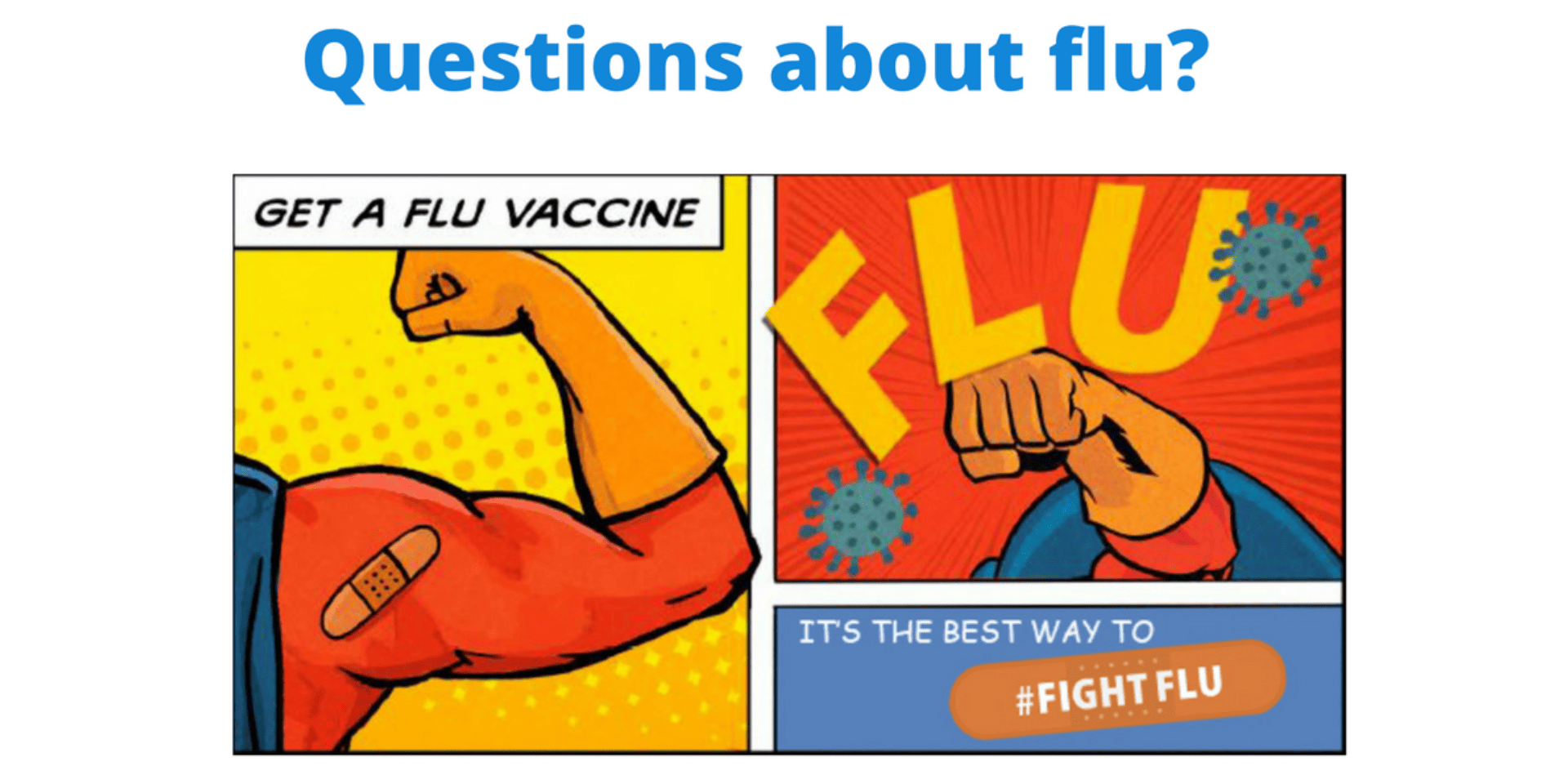
Special thanks to Vaccinate Your Family for co-sponsoring the Flu Facebook Forum during National Influenza Vaccination Week (NIVW), as well as those who took time to ask flu-related questions, and the NFID experts (William Schaffner, MD; Walter A. Orenstein, MD; Patricia A. Stinchfield, RN, MS, CPNP, CIC; Lisa S. Ipp, MD; and Kathleen M. Neuzil, MD, MPH) who provided detailed responses.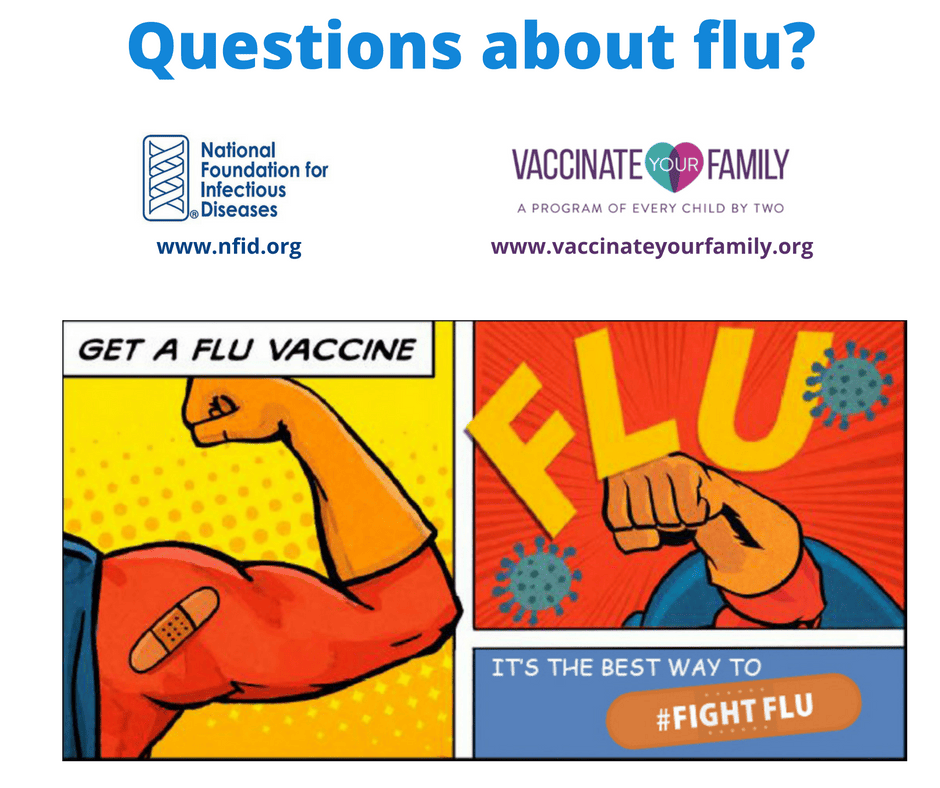
To read all of the questions, comments, and responses, view the Vaccinate Your Family Facebook post.
Can you explain how the flu vaccine works in the body to protect you from flu but it cannot actually give you flu?
The influenza antigen stimulates a specific antibody to influenza and files it away in your immune system in the event you are exposed to the same virus(es). The vaccine is a killed virus so it is enough protein to stimulate an immune response for protection but not enough to cause illness. While some people do feel mildly achy or “flu-like” for a day or two after the vaccine, this is a small fraction of how severely ill influenza disease can make you feel. The vaccine does NOT cause the symptoms of the disease which are high fever, sudden-onset, severe body aches, respiratory congestion, and coughing.
Does getting the flu vaccine lower your immune system, thereby making you more susceptible to infections?
The influenza vaccine builds antibodies specifically to fight the 3-4 strains of influenza that the vaccine prevents. The vastness of the immune system is capable of managing the vaccine-building protection without making one vulnerable to other diseases. There is more evidence that once someone develops influenza they are more susceptible to picking up other viral illnesses in the same season. The best step is to get the influenza vaccine each year.
It seems that some years, the flu vaccine has been ineffective for the type of flu that year. Is this true and how is the formula concocted?
Yes. There are some years when what is in the vaccine is not protective against the influenza virus circulating in the community. This is called an influenza vaccine mismatch.
How the annual influenza vaccine formula is “concocted” is a good short question with a long answer. Basically, the world has about 100 different surveillance sites that monitor year round the strains of influenza circulating. The World Health Organization (WHO) then makes recommendations based on the surveillance patterns in the Northern and Southern Hemisphere. Each country then approves which viruses should be included in the annual vaccine licensed in their country; for the US that is done by the US Food and Drug Administration (FDA) and then approved by the Advisory Committee on Immunization Practices (ACIP). This has to happen several months in advance of when flu season begins. Since influenza is such a complex and dynamic virus, it can drift to different strain(s) by the time winter arrives. Think of influenza vaccine like a colorful Rubik’s cube where even a slight change could cause a mismatch. To learn more about flu virus strain selection, visit https://www.cdc.gov/flu/about/season/vaccine-selection.htm
Can you post a list of what is actually in the flu shot?
Each vaccine has different ingredients but the common quadrivalent vaccine includes:
Flu Strain A/(California) (H1N1), Flu Strain A/(Hong Kong) (H3N2), Flu Strain B/(Brisbane), Flu Strain B/(Phuket), formaldehyde, aluminum salts, gelatin, thimerosal, chicken egg proteins, and antibiotics. The package insert contains a list of all ingredients for the specific vaccine. To read more about common ingredients in US licensed vaccines, visit http://www.fda.gov/BiologicsBloodVaccines/SafetyAvailability/VaccineSafety/ucm187810.htm.
Does the flu vaccine immunity wane during flu season? Can we consider our kids covered for the whole season, if we get the shot early?
Ideally, vaccination should occur before onset of influenza activity in the community, and healthcare providers routinely offer influenza vaccine by the end of October. It is particularly important to vaccinate children younger than 9 years who need 2 doses of the vaccine early, as that helps to ensure they have time to receive the 2nd dose before the start of the flu season. In any given season, it is difficult to determine the ideal time to give the vaccine because of the variability of flu season from year to year with respect to duration and timing. Though there has been some data to suggest that there is waning vaccine effectiveness later in the influenza season, particularly affecting elderly individuals, the evidence is inconsistent, and further evaluation is needed. Particularly for young adults and children, deferral of vaccination is not recommended, as it could result in missed opportunities to vaccinate. Even though in recent seasons there has been early availability of the vaccine, there is currently no recommendation to re-vaccinate later in the season.
Is it safe to get the flu shot when you have a cold, or should you wait?
The flu shot can be given if a patient is sick with a minor illness such as the common cold; however, if he or she has a fever, we typically wait until patient is afebrile for at least 24 hours.
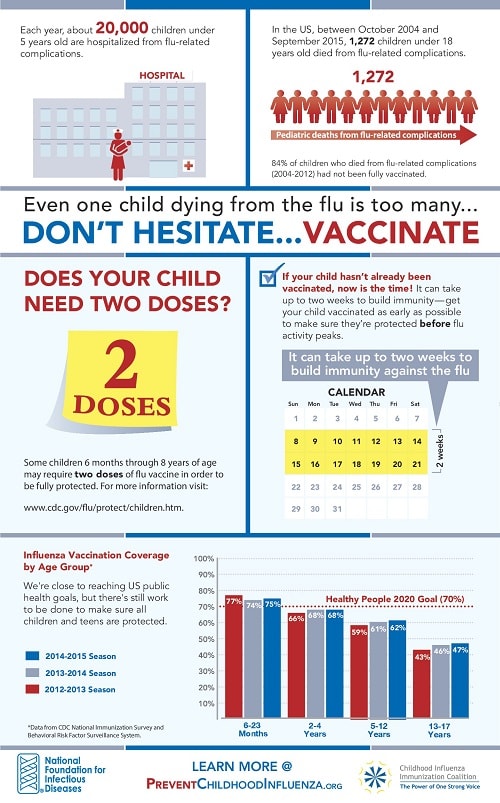 My son is 6 and received his first flu vaccination this year as he’s gotten the flu the past 3 years in a row. According to the Centers for Disease Control and Prevention (CDC) website, he needs to be vaccinated again for it to be effective. Should I call his doctor to get him another shot?
My son is 6 and received his first flu vaccination this year as he’s gotten the flu the past 3 years in a row. According to the Centers for Disease Control and Prevention (CDC) website, he needs to be vaccinated again for it to be effective. Should I call his doctor to get him another shot?
You are correct; your child needs a second influenza vaccine this season. Any child 6 months through 8 years of age who is receiving their first influenza vaccine should have 2 injections within the same season separated by 4 weeks. The first dose “primes” the immune system in this age group and the second dose offers protection. Call and make an appointment for his second vaccine 4 weeks after his first. To learn more, visit https://www.cdc.gov/flu/professionals/vaccination/vax-summary.htm.
I’m immune deficient and the quick swabs are not always accurate to diagnose flu. I can have the flu and it would still read negative. What method should be used to confirm diagnosis?
The real issue you raise is the need for treatment as possible with influenza antiviral drugs, should you have influenza. The effectiveness of antiviral drugs is greatest when they are started within 48 hours of onset of illness. Thus, clinical judgment is most important in making a decision. CDC states clearly that “decisions about starting antiviral treatment should not wait for laboratory confirmation of influenza” (see www.cdc.gov/flu/professionals/antivirals/index.htm).
Clinicians can contact their local or state health department about the level of influenza in their communities to assist them in making the judgment about whether your illness is likely to be influenza. While rapid influenza diagnostic tests can be useful if positive, their sensitivities are not ideal. According to CDC, a recent analysis of 159 studies showed an overall sensitivity of 62%. In other words, for 38% of persons with influenza, the test was falsely negative. Other more sensitive tests take time (for example, transport of specimens to a diagnostic laboratory) and by the time a result is obtained, you are likely to be beyond the 48 hours post-onset of illness optimal time for treatment. RT-PCR is the “gold standard” for diagnosis of influenza but again is not performed in every laboratory.
I have a four year old and a 14 month old child. Are there any side effects I should be concerned about before vaccinating? I have never given the flu vaccine to either.
The risk of a vaccine reaction are listed on Vaccine Information Sheets provided at the time of vaccine administration. The influenza VIS is available at: https://www.cdc.gov/vaccines/hcp/vis/vis-statements/flu.pdf. Most children do very well with the injectable influenza vaccine. Commonly there may be some redness and soreness at the injection site that lasts temporarily. Our children (and grandchildren) have had their influenza vaccines and we hope your children will too!
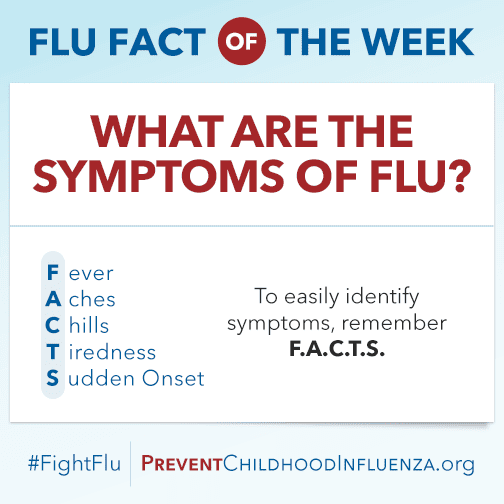 People often think they have the flu when they really have a common cold, which leads to the erroneous belief that the flu is harmless. Could you please describe symptoms of actual flu? And also clarify if there is such a thing as stomach flu?
People often think they have the flu when they really have a common cold, which leads to the erroneous belief that the flu is harmless. Could you please describe symptoms of actual flu? And also clarify if there is such a thing as stomach flu?
During flu season, there is a lot of coughing and sniffling and it is often hard to know what is causing the illness. One of influenza’s hallmarks is how suddenly one becomes sick with body aches, fever, chills, cough, headache, runny nose, sore throat, and fatigue. One minute you feel fine and then next your body is telling you to lie down. The common cold may more slowly sneak up over several days and most people will still have energy to go to work or school. However, the best advice is to stay home when you are sick to prevent the spread to others. Complicating things, there can be vomiting and diarrhea, especially in children who have influenza.
The “stomach flu” is a gastrointestinal virus (of which there are many) without the respiratory symptoms, which is not influenza but unfortunately gets called stomach flu. View infographics highlighting the difference between cold and flu at: https://www.pinterest.com/nationalfoundat/influenza-flu/
To join the conversation, follow NFID (@nfidvaccines) on Twitter using the hashtag #FightFlu, like NFID on Facebook, join the NFID Linkedin Group, and subscribe to NFID Updates.
Related Posts

ID News of Interest: Bird Flu, Measles, and Meningococcal Disease
CDC issued health alerts on bird flu, measles, and meningococcal disease. Read the latest news including insights and explanations from infectious disease experts …
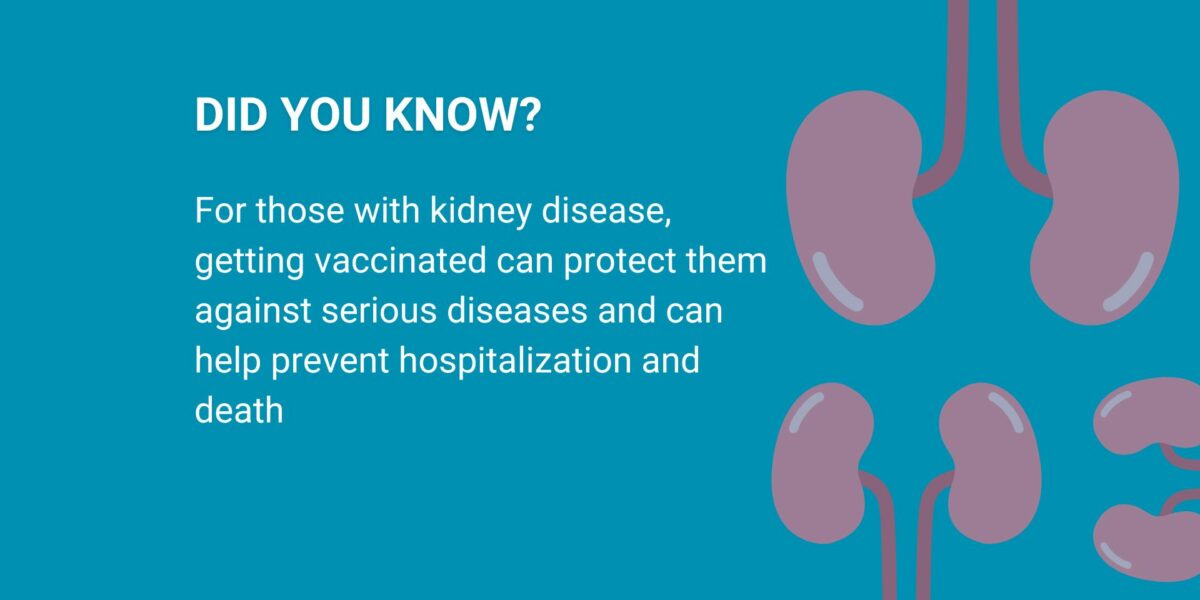
3 Things You Need to Know about Kidney Disease and Vaccines
It is important for people with kidney disease to understand how critical vaccination can be for their health and well-being

5 Reasons Why Vaccines Are Good for Your Heart
For people with heart disease, getting vaccinated is as important to staying healthy as diet and exercise
